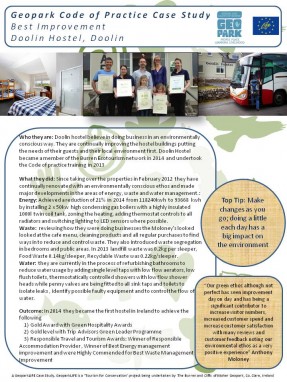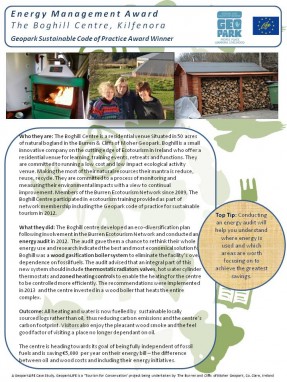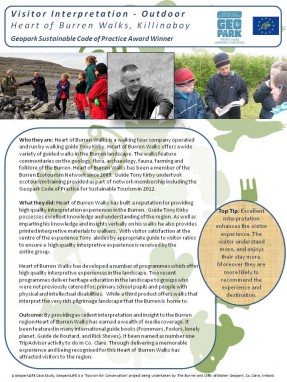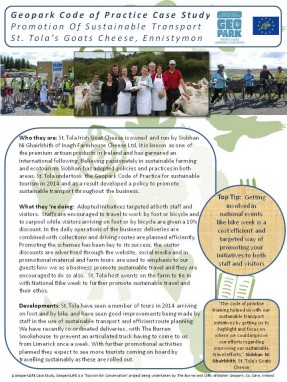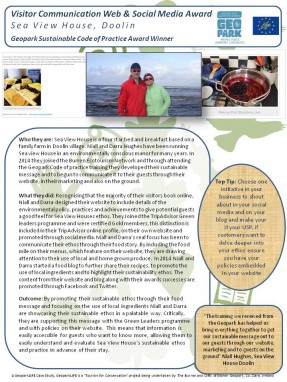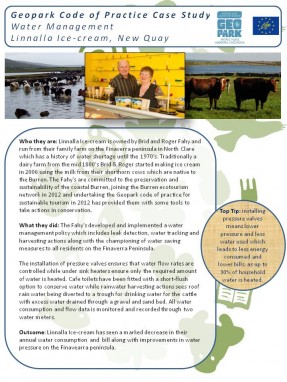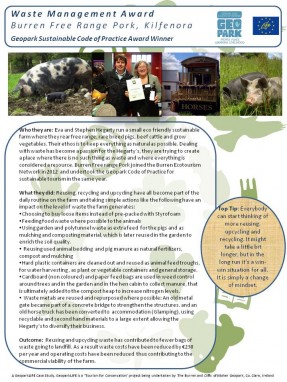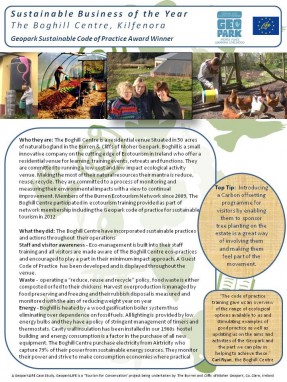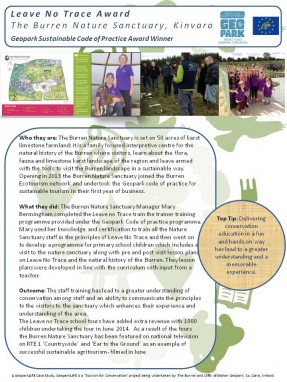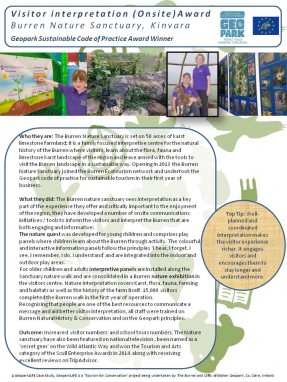The Geopark Code of Practice for Sustainable tourism Businesses Principles
The Code of Practice Principles embody the overall spirit and intent of the Code. Click on each Code Principle below to get an overview of what’s involved.
We collaborate with all stakeholders to collectively develop the Geopark as a sustainable tourism destination.
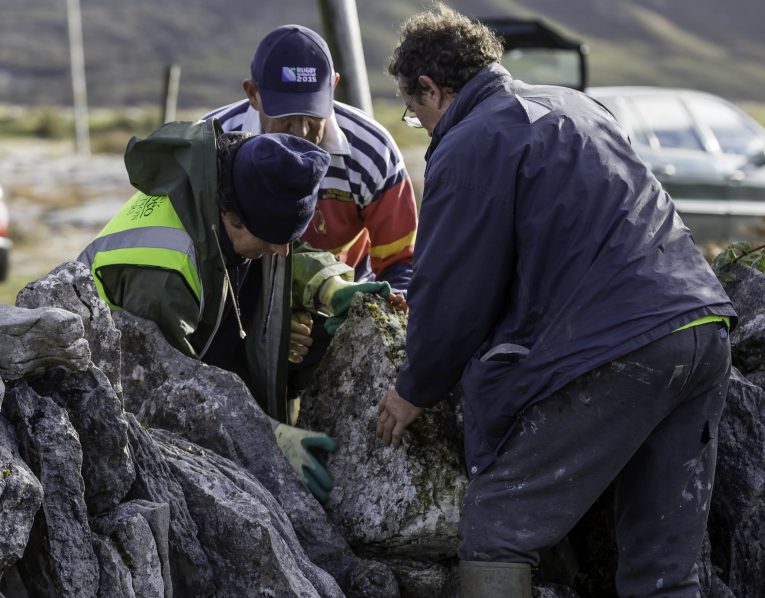
Volunteers Stephen Hegarty and Richard Jones help repair an old stone wall.
Together is better. This is a simple yet core principle of sustainable tourism. Tourism enterprises working collectively on areas of active conservation, destination marketing, networking and advocacy can become a powerful and influential unit in the sustainable development of their region. Enterprises can share knowledge and solutions, collaborate to improve the visitor experience, and make a tangible and incremental contribution to the conservation of the landscape. Moreover, coming together enables tourism enterprises to better engage with other important stakeholders such as local authorities, regional and national policy makers, training organisations, funders and trade and marketing bodies. Through collaboration, all stakeholders are enabled to move beyond their specific remit, to find progressive solutions that can balance the conservation of the landscape with the needs of visitors and the local economy.
We actively participate in conserving our natural and cultural heritage.
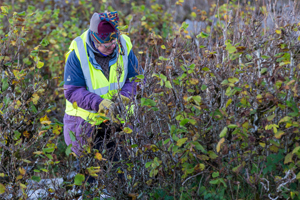
Eva Hegarty of Burren Free Range Pork cutting back Hazel scrub
The particular landscape and natural heritage of an area is a primary attraction for visitors, and is a core element of the overall visitor experience. It is therefore important for the tourism sector to contribute to the protection, conservation and management of local biodiversity and landscapes. Our natural and cultural assets are inherited from those who went before us, and we stand today as custodians of this precious heritage for future generations. In recognition of this, tourism enterprises are encouraged to actively care for the landscape upon which their very livelihoods depend. In keeping with the principle of Working Together, collective actions are encouraged as they may achieve greater reach and impact than a series of discrete actions by individual enterprises.
We offer quality information and interpretation to communicate our stories and the unique character of our place to guests.
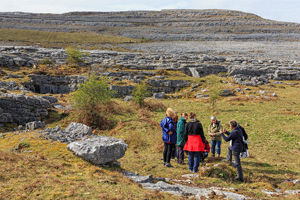
Tony Kirby of Heart of Burren Walks interpreting the landscape for visitors during a guided walk in the Burren
An area’s natural and cultural heritage is a primary factor in attracting visitors to a region, and is a core element of the overall visitor experience. The interpretation itself makes connections with people by communicating the significance of a particular landscape, archaeological site, historic building or object collection, for example. This in turn helps to reinforce the cultural identity of that particular area. Interpretation strongly influences visitor perceptions of the destination – the better the interpretation, the better the visitor experience. Importantly, interpretation can help visitors to understand how best to behave in the landscape. Finally, high quality interpretation makes visitors feel at home in the destination, enticing them to return again and also to recommend this place to their friends and family.
We work to ensure that tourism makes a positive social contribution so that it benefits our community as well as our guests. We aim to make our services available to the widest possible audience.
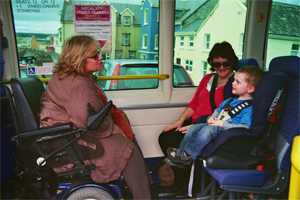
We are guided by our Environmental Policy and we work to an Environmental Action Plan, which includes actions and targets for improvement that are reviewed annually.
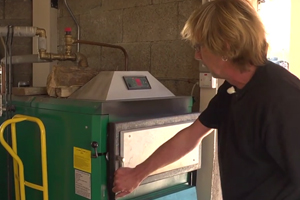
John Harrison of the Boghill Centre using his wood chip boiler
As a region develops its tourism industry, it produces significant impact on natural resources, consumption patterns and pollution. The response to this is that the community as a whole and the tourism sector in particular needs to re-focus and adapt. A balance has to be found between limits and usage so that environmental concerns can be addressed through policies, practices and initiatives with others. While policy-makers are very influential in this regard, there is much that can be achieved at the level of the individual tourism operator. Enterprises that implement a structured environmental management system which monitors their usage and consumption patterns can gain true visibility on their impacts over time. Based on sound knowledge and data, the enterprise can identify priority action areas and develop a phased management plan for ensuring continuous improvement.
We contribute to the local economy by maintaining and supporting local employment, by sourcing services and produce locally wherever possible, and by engaging with other businesses in promoting our region as a sustainable tourism destination.
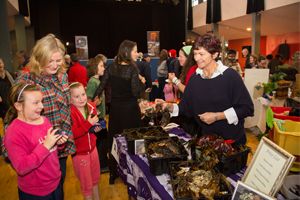
Celebrating local food at the annual Burren Food Fayre
There are many ways in which a tourism enterprise can support the economic pillar within a sustainable destination. Choices that an enterprise makes with regard to employment, sourcing, and purchasing have a direct and significant impact on the overall economic sustainability of a region. Working collectively, tourism enterprises can collaborate to create a strong unique selling point for the destination. Such an approach significantly enhances the ability of the area to achieve cut-through in the regional, national or international market place. Moreover, high quality visitor experiences that communicate the unique character of a place encourage visitors to explore further, resulting in a longer length of stay and a higher spend.
By working together, a strong and vibrant economy can be created and protected, one where individuals, families and communities thrive.
We have effective systems for monitoring and adequately managing our waste, water, wastewater, energy, travel impact and purchases.
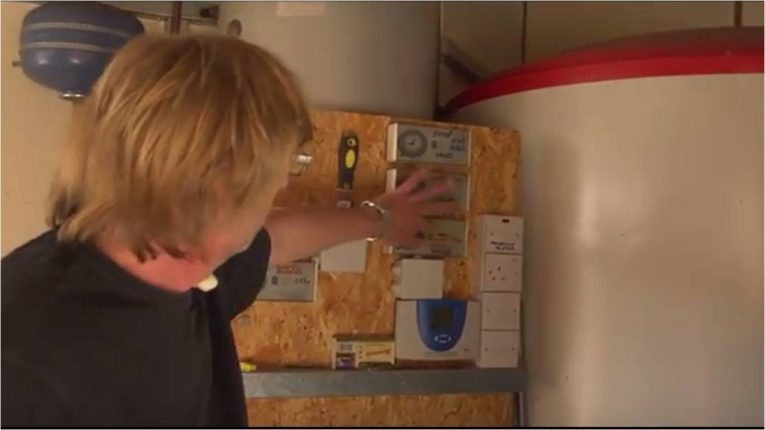
Monitoring energy usage at the Boghill Centre
As a region develops its tourism industry, there can be significant impact on natural resources, consumption patterns and pollution. The response to this is that the community as a whole, and the tourism sector in particular, need to re-focus and adapt. A balance has to be found between limits and usage so that environmental concerns can be addressed. While policy-makers and regulators are highly influential in this regard, there is much that can be achieved at the level of the individual tourism operator. Enterprises that implement a structured environmental management system which monitors their usage and consumption patterns can gain true visibility on their impacts. Based on sound knowledge and data, the enterprise can identify priority action areas and develop a phased management plan for ensuring continuous improvement.
Case Study of Sea View House
Please click on the image to open PDFs and view the videos
